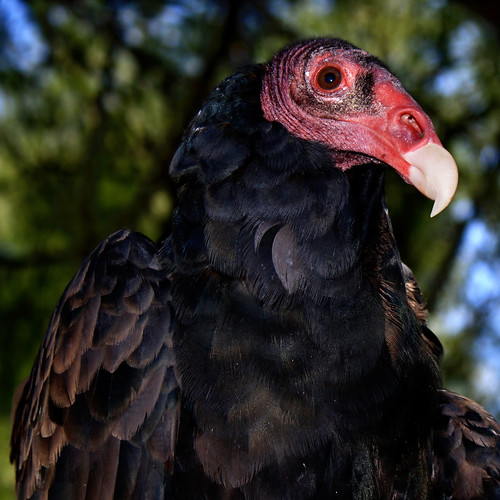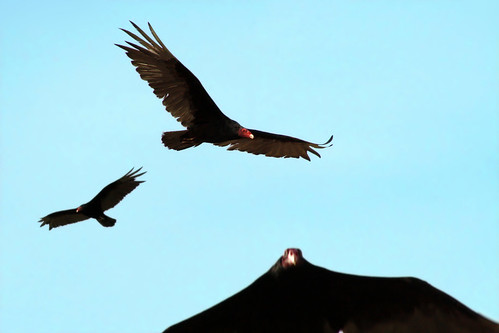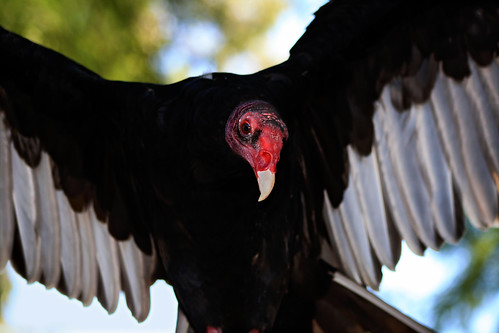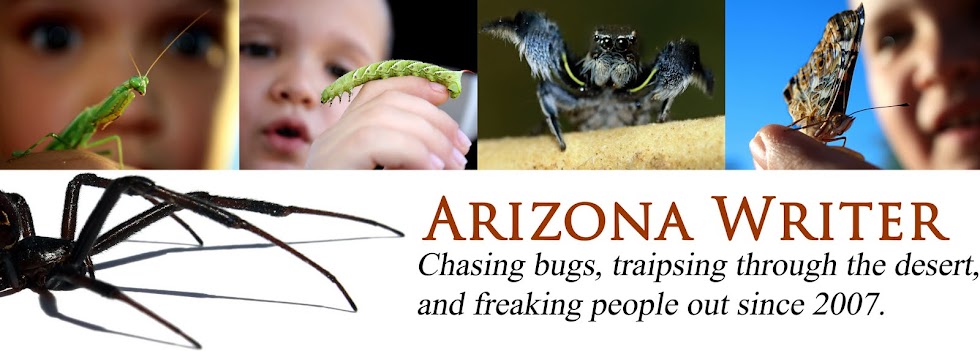 I don't think they're "pretty for something so ugly." Nor do they have "faces only a mother could love." They're not "necessary, but hideous." Not merely "fascinating." And though I will gladly take the props (seriously, make with more props; I have a huge ego and it's hungry), my photos aren't "gorgeous, especially for pictures of a vulture."
I don't think they're "pretty for something so ugly." Nor do they have "faces only a mother could love." They're not "necessary, but hideous." Not merely "fascinating." And though I will gladly take the props (seriously, make with more props; I have a huge ego and it's hungry), my photos aren't "gorgeous, especially for pictures of a vulture."I think turkey vultures are gorgeous. Like, actually gorgeous. Photogenic. As in pretty.
I especially love this turkey vulture. Meet Ed (or meet her again, if you've already seen the several shots of her on my Flickr stream). She's a rescued turkey vulture, cared for by volunteers from the Adobe Mountain Wildlife Center. There seems to be some debate as to whether "Ed" stands for Edna or Edwina (in addition to "Education"), but she is definitely female. Everyone always assumes she's male, but I feel like I can see it in her eyes. I am, of course, imagining this. I know because they told me. Still, I feel it.
My son loves her too, as well as all turkey vultures. Vultures were one of the first animals about which he learned real facts, thanks to Ed and
 Boyce Thompson Arboretum's annual "Bye-Bye Buzzards" event in September each year (when turkey vultures prepare to migrate to Mexico) and the "Welcome Back Buzzards" get-together in March. Every kid loves animals, but this kid is different. I think I can trace it back to a few animal encounters, one of the earliest being turkey vultures. Ever since the first one he saw one up-close, he's wanted to really know them.
Boyce Thompson Arboretum's annual "Bye-Bye Buzzards" event in September each year (when turkey vultures prepare to migrate to Mexico) and the "Welcome Back Buzzards" get-together in March. Every kid loves animals, but this kid is different. I think I can trace it back to a few animal encounters, one of the earliest being turkey vultures. Ever since the first one he saw one up-close, he's wanted to really know them.I could tell him quite a bit about turkey vultures, though he knows half of it already. Their ecological role ("nature's cleanup crew," as the saying goes). Their lineage. (Turkey vultures; commonly called buzzards after the name was given to them by European settlers, who thought the birds looked like their common buzzards; are actually more closely related to storks and ibises than raptors.)
I could describe the way morning light bleeds through a vulture's wings as it spreads them up to six feet wide; in a gesture said to warm the wings, dry morning dew and bake away bacteria while vultures wait to glide.
 I could describe their food-hunting prowess. Turkey vultures, possessing some of the best eyes of any land animal, rely as well on their ability to sniff out ethyl mercaptan in decaying carcasses. We could relive the story about my son trying to fart to attract turkey vultures. (Ethyl mercaptan being the pungent component in flatulance -- see how fun it is to be a sciencey family?)
I could describe their food-hunting prowess. Turkey vultures, possessing some of the best eyes of any land animal, rely as well on their ability to sniff out ethyl mercaptan in decaying carcasses. We could relive the story about my son trying to fart to attract turkey vultures. (Ethyl mercaptan being the pungent component in flatulance -- see how fun it is to be a sciencey family?)I could go on about their built in swamp-cooling system, which really just involves peeing on their own legs but has a fancy scientific name, urohydrosis. Their courting ritual, which involves the male and female nibbling each other's wrinkly red heads. The proper name for a group of them (a venue, or a kettle when circling -- never a flock), their migration patterns, the way they ride air currents, their lack of a nasal septum, their cool vomiting defense, or any of a million other things. I really love these birds.
However, the thing that most gets me is their bad rap.
Of all animals to get an unfair shake in popular opinion, vultures have to top the list. The other usual suspects -- spiders, snakes, ants -- have their superheroes, smitten celebrity advocates and Disney popularizers. But even Edgar Allen Poe, whose take on the oft-vilified raven had it as "stately" and "of the saintly days of yore," harbored no love for vultures. His protagonist in "The Tell-Tale Heart" murders a man for the sole reason that "he had the eye of a vulture." The heinous eye, Poe's hero held, was "a dull blue, with a hideous veil over it that chilled the very marrow in my bones."
 Which isn't even accurate, as far as vulture eyes go. Who ever heard of a vulture with blue eyes? Who looks close enough to know better?
Which isn't even accurate, as far as vulture eyes go. Who ever heard of a vulture with blue eyes? Who looks close enough to know better?Charles Darwin called our poor turkey vulture "a disgusting bird, with its bald scarlet head formed to wallow in putridity." When reporters are said to "swoop in" on death and misfortune, we know exactly what is meant by the phrase "a bunch of vultures." Even the Bible gives the birds a short shrift, calling them "an abomination."
In comics, arachnids get Spider-Man. Vultures get his rangy beanpole of a foe The Vulture, a nefarious bald villain and remorseless killer who exploits even his allies. In movies, the good-guy-harassing angular ships in Star Wars became known as vulture droids. Even Disney makes its vultures look considerably less cuddly than its ants, depicting them as ungainly, indecisive nerds perching on a rotted, gnarled branch. Businesses that prey on destitute countries, snatching up financial shares at low prices, are known as vulture funds. Dishonest lawyers are called vultures. Virtually nowhere in the western world is calling someone a vulture considered a compliment. And though I've never heard anyone called a turkey vulture, calling one a turkey is hardly considered high praise, and I'm fairly sure no one save turkey-advocate
 Ben Franklin would consider adding "turkey" to "vulture" a flattering amendment.
Ben Franklin would consider adding "turkey" to "vulture" a flattering amendment.It hasn't always been this way. In ancient Egypt, the vulture was associated with the goddess Nekhbet and was the symbol of the upper kingdom. In India, vultures guarded the gates to the underworld. In times past in North America, the vulture was revered; it was the California condor, of the vulture family, that gave shape and form to the legendary Thunderbird. The turkey vulture's Latin name, Cathartes aura means air purifier, or just purifier, and indeed several cultures have seen it as a symbol of purification. Some Native American myths have it saving the world, using its head to push the sun to an optimal distance, becoming bald in the process. Wilbur Wright called turkey vultures "the most perfectly trained gymnasts in the world and are specially well fitted for their work, and it may be that man will never equal them."

Invariably at the "Bye-Bye Buzzards" and "Welcome Back Buzzards" events someone suggests, in conciliatory tones, that we love vultures for their janitorial services. You know, even though they're so ugly. I guess that's enough for some. I'm glad the birds provide the service, of course. Circle of life, and all that.
But I don't love the birds because they clean our shared environment. It has an uncomfortable feel of loving something only insofar as it's useful to me. Their personality, I think. Maybe that's getting a little closer. They're primal, with a dash of latent cleverness. People might be partial to the hawks and eagles, the emblematic hunters. But turkey vultures wait. They're patient, almost as if respectful of the death upon which they feed.
But that's unfair too, of course. Turkey vultures aren't philosophers. They aren't people.
David's conclusion is to like them "because they're cool" -- just to like them because they are.
I think that's pretty darn close. Also? I really do think she's beautiful.
I've been visiting Ed for the past four years, and watching her kin for ages before that. They ride thermals, roll and twist, seeming to scrape the clouds with their silvery wingtips. They make life out of death, utility out of garbage, and they make it look good. If I feel crappy and I take a drive and watch the vultures, I feel better.
It's pure. It's my catharsis.

